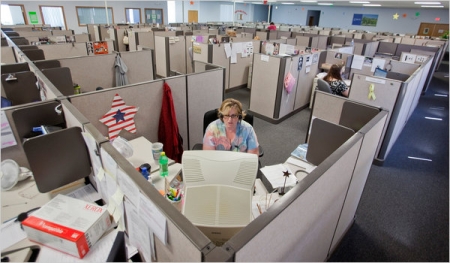August 1st, 2010 by Berci in Better Health Network, News, Research
No Comments »

 There’s a new profession in the Internet era, the so-called “Internet Content Reviewer.” These people check all of the submissions and uploads on huge social networking sites, review tens of thousands of pictures, and make sure only legal content is being uploaded to these communities.
There’s a new profession in the Internet era, the so-called “Internet Content Reviewer.” These people check all of the submissions and uploads on huge social networking sites, review tens of thousands of pictures, and make sure only legal content is being uploaded to these communities.
It seems a new mental health, “social” disease is starting to spread: Internet Moderitis. An excerpt from a New York Times piece on the topic:
Ricky Bess spends eight hours a day in front of a computer near Orlando, Fla., viewing some of the worst depravities harbored on the Internet. He has seen photographs of graphic gang killings, animal abuse and twisted forms of pornography. One recent sighting was a photo of two teenage boys gleefully pointing guns at another boy, who is crying.
YouTube, a division of Google, is an exception. If a user indicates a video is inappropriate, software scans the image looking for warning signs of clips that are breaking the site’s rules or the law. Flagged videos are then sent for manual review by YouTube-employed content moderators who, because of the nature of the work, are given only yearlong contracts and access to counseling services, according to Victoria Grand, a YouTube spokeswoman.
Photo credit: Stephen Mally for The New York Times
*This blog post was originally published at ScienceRoll*
July 2nd, 2010 by EvanFalchukJD in Better Health Network, Health Tips, Opinion, Research
2 Comments »

When healthcare reform became law, HR and benefits professionals I spoke with had two reactions: surprise and annoyance. Surprise, because they thought reform was dead; annoyed, because the law was full of provisions that didn’t make sense to them. But it was partly their own fault.
Blogs and other social media were buzzing with healthcare reform talk for more than a year, and were more influential than ever. But HR and benefits professionals –- experts in the topic –- were mostly on the sidelines. They didn’t shape the debate, didn’t point out when people didn’t know what they were talking about, didn’t talk about how what was proposed would affect what they did for a living.
Don’t take my word for it. A study last year on social media use by HR professionals revealed some striking results:
- Only 13 percent use RSS feeds, tags and bookmarks
- Only 5 percent post original content to blogs and website
- Only 4 percent post ratings and reviews or comments on blogs and online forums
Reform shows there are real consequences to this failure to participate in social media. If you’re not part of the conversation, you’re marginalizing yourself, losing influence within your organization and the world.
So let this be a wake-up call: Get involved in social media. Easy to say, but how do you get started? Read more »
*This blog post was originally published at See First Blog*
June 22nd, 2010 by PhilBaumannRN in Better Health Network, Health Policy, Opinion
No Comments »

Should we have a Bill of Rights for social media sites? It’s something we need to consider as such software becomes an integral part of our daily communications.
Some might say such a document isn’t needed, that we aught to take a buyer-beware approach. But I would argue that the core issue of the privacy threats of new media isn’t really privacy, but rather dignity. Having to go through fifty steps to set your privacy settings is undignified, even if your privacy is ensured.
So if we value human dignity, we aught to consider standards of dignity. A Bill of Rights, even if unenforceable, may at least remind us of the disturbing force of social technologies. What’s your take?
*This blog post was originally published at Phil Baumann*
 There’s a new profession in the Internet era, the so-called “Internet Content Reviewer.” These people check all of the submissions and uploads on huge social networking sites, review tens of thousands of pictures, and make sure only legal content is being uploaded to these communities.
There’s a new profession in the Internet era, the so-called “Internet Content Reviewer.” These people check all of the submissions and uploads on huge social networking sites, review tens of thousands of pictures, and make sure only legal content is being uploaded to these communities.












